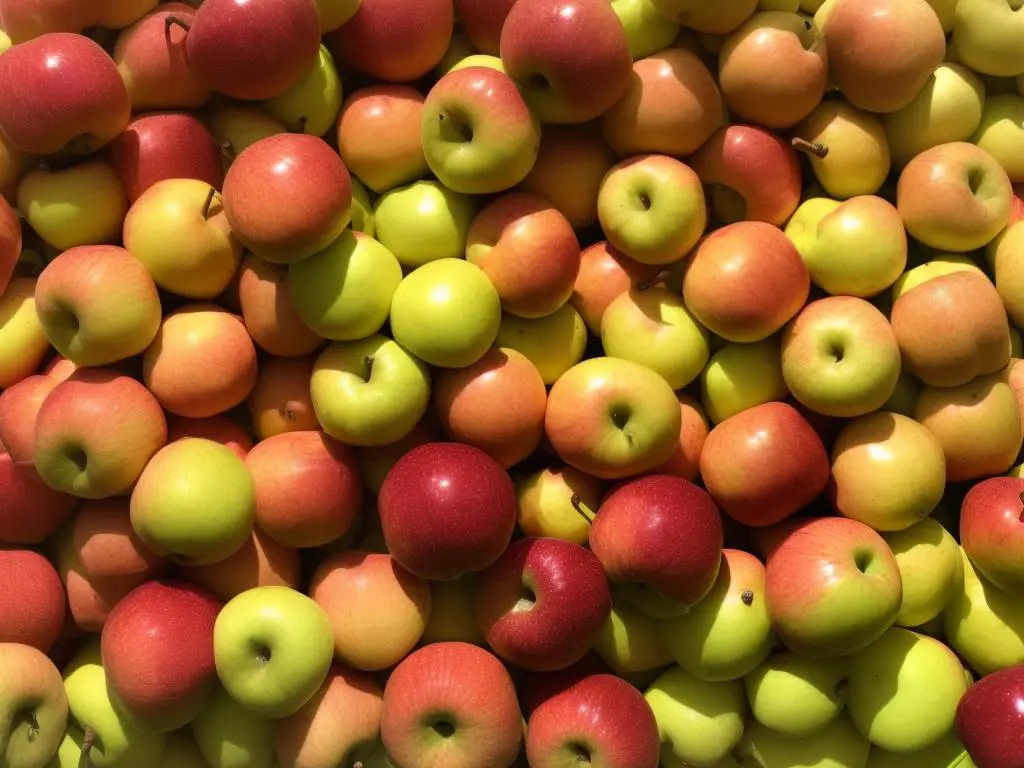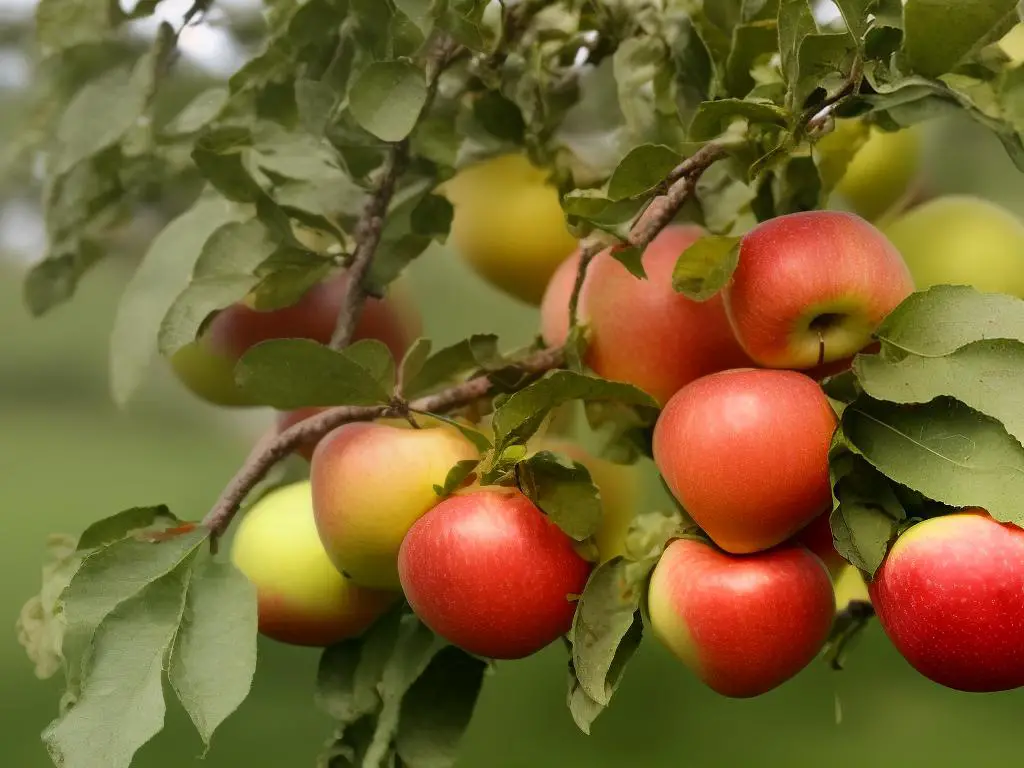Ambrosia apples have long been admired for their delightful taste and visually appealing appearance, but their nutritional benefits are often overlooked. In this exploration, we delve into the health advantages of this fruit, how they compare to other apple varieties, and how to incorporate them into your daily diet. Furthermore, we’ll discuss the proper storage techniques and address frequently asked questions related to these exceptional apples.
Health Benefits of Ambrosia Apples
Ambrosia Apples: A Delicious and Nutritious Snack
Ambrosia apples are not only a delicious variety of apple but also offer numerous health benefits due to their impressive nutritional profile. One of the key advantages of incorporating Ambrosia apples into your diet is their high fiber content. A medium-sized apple can contain around 4 grams of dietary fiber, which can help improve digestion, lower cholesterol levels, and even aid in weight management. The soluble fiber present in apples forms a gel-like substance in the gut, which can slow down digestion and make you feel fuller for longer periods.
The Benefits of Vitamin C in Ambrosia Apples
Another important nutrient found in Ambrosia apples is vitamin C. This essential vitamin is known for its immune-boosting properties, helping to ward off colds and other illnesses. A single medium-sized Ambrosia apple can provide about 14% of the recommended daily intake of vitamin C. Moreover, vitamin C also acts as an antioxidant, protecting your cells from damage caused by free radicals, which can contribute to chronic diseases like cancer and heart disease.
Low-Calorie Snacking with Ambrosia Apples
Ambrosia apples are also an excellent low-calorie snack option, making them an ideal choice for those looking to maintain or lose weight. A medium-sized apple contains around 95 calories, which is significantly less than many other popular snacking options. The natural sweetness and satisfying crunch of Ambrosia apples can help combat sugar cravings and keep hunger at bay.
Ambrosia Apples and Antioxidants
The antioxidants and phytonutrients in Ambrosia apples contribute significantly to one’s overall health. Polyphenols are the primary source of antioxidants in apples, contributing to their ability to fight against oxidative stress. These antioxidants can help reduce inflammation, protect against age-related cognitive decline, and lower the risk of chronic health issues such as diabetes and cardiovascular diseases. Moreover, phytonutrients like quercetin and catechin in Ambrosia apples have been found to have anti-inflammatory and antiviral properties, further boosting overall health.
Essential Minerals in Ambrosia Apples
Ambrosia apples are a nutritious and delicious fruit, boasting a high fiber content and abundance of vitamin C. Furthermore, they provide essential minerals such as potassium and phosphorus, which are crucial for maintaining optimal fluid balance, supporting muscle function, and promoting strong bones and teeth. Incorporating Ambrosia apples into your diet can be a tasty way to promote overall wellness and a healthy lifestyle.

Comparison to Other Apples
Comparing the nutritional profiles of Ambrosia apples with other popular apple varieties like Granny Smith and Fuji apples reveals some key differences. These disparities include variations in fiber, vitamin C, sugar content, and calorie count. By exploring these factors, we gain insight into the unique properties and benefits of Ambrosia apples nutrition.
Fiber Content
In terms of fiber content, Ambrosia apples generally have a comparable amount of fiber to other apple varieties, with one medium-sized apple containing approximately 4 grams of dietary fiber. This is similar to other apple varieties, including both Granny Smith and Fuji apples, which also provide about 4 grams of fiber per medium-sized apple. Dietary fiber is important for maintaining digestive health and can also help regulate blood sugar levels.
Vitamin C Content
When comparing vitamin C content, Ambrosia apples contain a slightly lower amount of vitamin C than other apple varieties, providing about 8% of the Daily Value (DV) per medium-sized apple. In contrast, Granny Smith apples contain approximately 10% of the DV for vitamin C, while Fuji apples provide 11% of the DV. Even though Ambrosia apples contain slightly less vitamin C, they still contribute a decent portion of this essential nutrient, which is important for immune function, collagen synthesis, and antioxidant protection.
Sugar Content
Regarding sugar content, Ambrosia apples tend to be naturally sweeter and have a higher sugar content than some other popular apple varieties. One medium-sized Ambrosia apple contains about 22 grams of sugar, while Granny Smith apples, known for their tart flavor, have around 16 grams of sugar, and Fuji apples, which are moderately sweet, contain about 18 grams of sugar. Despite having a higher sugar content, Ambrosia apples can still be a part of a balanced diet as the sugars found in fruits are natural and accompanied by beneficial nutrients, such as fiber and vitamins.
Calorie Count
In the calorie department, Ambrosia apples are relatively similar to other apple varieties. A medium-sized Ambrosia apple contains about 95 calories, which is close to the calorie content found in Granny Smith and Fuji apples, with both varieties providing around 90-100 calories per apple. This makes Ambrosia apples a low-calorie snack option that can be easily incorporated into a healthy eating plan.
Overall Nutritional Profile
When compared to other popular apple varieties such as Granny Smith and Fuji apples, Ambrosia apples exhibit a slightly different nutritional profile. Due to their higher sugar content, these apples boast a naturally sweeter taste but still provide a comparable fiber content, vitamin C content, and calorie count to other apple types. Each variety of apple possesses its unique properties and nutritional benefits, and incorporating a diverse range of fruits in the diet ensures a well-balanced intake of essential nutrients.

Tips for Enjoying Ambrosia Apples
Ambrosia apples, famed for their distinctive honeyed flavor, serve as an excellent choice for incorporating into various recipes and snacks, seamlessly blending both taste and nutrition.
They’re not only delicious, but these apples are also packed full of nutrition, such as being an excellent source of fiber, vitamin C, and potassium.
One way to enjoy Ambrosia apples is by pairing them with something rich and creamy like peanut butter. Slice the apples into thin pieces and spread a layer of peanut butter on each slice. This creates a tasty and balanced snack that combines the natural sweetness of apples with the protein and healthy fats found in peanut butter.
Another tip for enjoying Ambrosia apples is to add them to salads. The sweet and juicy flavor of these apples complements different types of greens and other salad ingredients quite well. For example, you can create a spinach and apple salad by combining baby spinach, sliced Ambrosia apples, toasted walnuts, crumbled feta cheese, and a light vinaigrette dressing. The diverse textures and flavors of this salad offer a satisfying and nutritious meal option.
Ambrosia apples can also be utilized to make nutritious and delicious smoothies. To create an apple pie smoothie, blend together an Ambrosia apple with Greek yogurt, a splash of almond milk, some ice, and a pinch of cinnamon. This nutritious and tasty smoothie provides protein from the Greek yogurt, vitamins and fiber from the apple, and a natural touch of sweetness and warmth from the cinnamon. Smoothies featuring Ambrosia apples are a perfect on-the-go breakfast or snack option, providing a great balance of nutrition and flavor.
Incorporating Ambrosia apples into baked goods can be another enjoyable way to experience their flavor while benefiting from their nutritional content. They can be used as a substitute for other apples in recipes such as muffins, apple crisp, or even as a topping on oatmeal. One idea for a healthy breakfast is to slice an Ambrosia apple and combine it with cooked oats, a sprinkle of cinnamon, and a drizzle of maple syrup. This warm and comforting meal combines the sweetness of Ambrosia apples with the fiber from the oats, creating a lasting sense of fullness and satisfaction.
Don’t underestimate the simple yet satisfying experience of enjoying Ambrosia apples on their own. Their natural sweetness and crisp texture make these apples a perfect portable snack. Carrying a whole Ambrosia apple in your bag to snack on throughout the day can help curb your appetite for unhealthy snacks while providing a nutritious and enjoyable treat.

Storing and Selecting Ambrosia Apples
Ambrosia apples have gained popularity among those seeking sweet, crisp, and nutritious snacks. Grown in Canada, the United States, and other parts of the world, these apples offer a range of nutrients essential for a healthy diet, including dietary fiber, vitamin C, and potassium. So, go ahead and relish the delightful taste and nutritional benefits Ambrosia apples have to offer.
When shopping for Ambrosia apples, it’s important to know what to look for to ensure you’re selecting the freshest fruit with optimal nutrition.
How to select the best Ambrosia apples
- Look for apples with a smooth, shiny skin that is free of bruises or punctures.
- The coloring should be a blend of pale red and golden yellow, which is unique to the Ambrosia apple variety.
- When gently squeezed, the apple should feel firm and heavy for its size, indicating freshness and juiciness.
- A pleasant and mildly sweet aroma is another indication of a quality Ambrosia apple.
When you take your Ambrosia apples home, proper storage is essential for maintaining their freshness, flavor, and nutritional value.
Proper storage tips for Ambrosia apples
- Ideally, store apples in the refrigerator to slow down the ripening process and prolong their shelf life.
- Use the crisper drawer to provide a slightly more humid environment, which helps to prevent the apples from drying out.
- Keep the apples loosely wrapped or in a perforated plastic bag to allow for proper air circulation.
It’s important to note that apples give off ethylene gas, which can cause other fruits and vegetables to ripen more quickly.
To store your Ambrosia apples properly at room temperature, place them in a cool, dark, and well-ventilated area, away from direct sunlight.
- Keep in mind that storing Ambrosia apples near bananas and other ethylene-producing fruits may lead to accelerated ripening, reduced shelf life, and potential spoilage.
Regularly check the apples, as one damaged or overripe apple can cause the rest to spoil more quickly.

Frequently Asked Questions about Ambrosia Apples
When it comes to Ambrosia apples nutrition, people often wonder about their sugar content. Although these apples contain natural sugars that contribute to their sweet taste, they have lower acidity levels, which make them taste even sweeter than other varieties. Despite this, the sugar in Ambrosia apples is fructose, a natural sugar that’s healthier compared to added or refined sugars found in processed foods. As long as you consume them in moderation, the fiber content in Ambrosia apples will help regulate blood sugar levels, making them a healthy choice for most individuals.
Some people might wonder if there are any allergy concerns associated with consuming Ambrosia apples. Generally, apples are considered to be a low-allergy-risk fruit. However, individuals who are allergic to birch pollen may experience Oral Allergy Syndrome (OAS) when eating certain fruits, including apples. OAS symptoms typically include itching and mild swelling of the lips, mouth, and throat. It is essential for those with a known fruit allergy to consult a medical professional before consuming any variety of apple, including Ambrosia.Diabetics often have concerns related to consuming fruits like apples due to their sugar content. Ambrosia apples, like other varieties, have a low glycemic index (GI), which means they have a minimal impact on blood sugar levels when consumed in moderation. Moreover, the fiber content in apples can help slow down the absorption of sugar in the bloodstream, further reducing blood sugar spikes. Thus, Ambrosia apples can be a part of a diabetic diet when consumed in moderation and as per the guidance of a healthcare professional.Another aspect to consider when discussing Ambrosia apples nutrition is their overall nutrient content. Ambrosia apples are packed with essential nutrients, including fiber, vitamin C, potassium, and antioxidants. These nutrients contribute to various health benefits, such as supporting a healthy immune system, promoting heart health, and aiding in digestion. Furthermore, due to their naturally sweet taste, Ambrosia apples can serve as a healthier alternative to satisfy cravings for sugary snacks.Lastly, people often inquire if organic Ambrosia apples offer any additional nutritional benefits compared to conventionally grown ones. Organic and conventionally grown apples both provide essential nutrients and health benefits. However, some studies suggest that organic fruits, including apples, may have higher antioxidant content due to the absence of synthetic pesticides, which can interfere with the plant’s natural production of these beneficial compounds. Additionally, organic apples may carry a lower risk of pesticide residue exposure. Choosing between organic and conventionally grown Ambrosia apples comes down to personal preferences and priorities related to health, environment, and budget considerations.

Overall, Ambrosia apples provide a wealth of nutritional benefits, making them a smart and delicious addition to any diet. By understanding the advantages they offer compared to other apples and learning how to incorporate them into meals, as well as proper storage methods, you can enjoy the optimal freshness and health benefits that these unique fruits provide. As you savor the delightful taste of Ambrosia apples, you can also take satisfaction in knowing that you are making a nutritious choice for your overall well-being.
